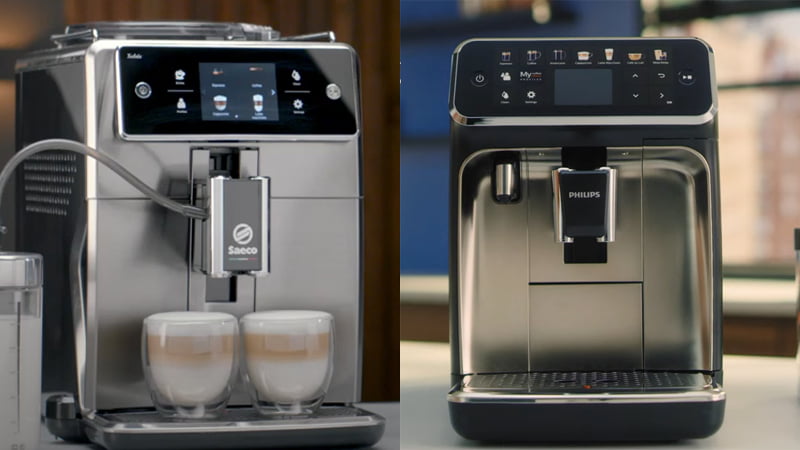For those on the hunt for an affordable super-automatic espresso machine that doesn’t exceed the $2000 mark, I present to you two noteworthy contenders: the Saeco Xelsis vs Philips 5400. While both machines offer commendable features given their price range, the Saeco Xelsis emerges as the ultimate winner in this comparison.
Despite being a mid-range model, the Saeco Xelsis still boasts features often found in premium machines, such as a dual thermoblock boiler system and the ability to prepare two milk-based drinks simultaneously. I was also impressed with the café-grade microfoam that eludes many of its automatic competitors.
The Philips 5400 is the latest automatic model in the Philips LatteGo series, but it doesn’t outshine its predecessors by a wide margin. I liked the addition of the user profile function, and the espresso tasted very good after a few tweaks. Still, the milk foam texture left a lot to be desired.
Saeco Xelsis Vs Philips 5400: Comparison Chart




Last update on 2025-04-14 / Affiliate links / Images from Amazon Product Advertising API
Saeco Xelsis Vs Philips 5400: Differences
In this head-to-head match, the Saeco Xelsis edged out the Philips 5400 with a narrow 3-2 victory. Dive deeper to discover which one aligns with your needs.
Coffee Flavour
Winner: Saeco Xelsis
Built-in Grinder
Both the Saeco Xelsis vs Philips 5400 have a ceramic burr grinder, which is, in my opinion, the best type available for grinder espresso machines since it can produce a super consistent grind without destroying the flavor and aroma of coffee. It usually costs upwards of $200 alone, so it’s great to see it on these mid-range machines.
This grinder is known for producing a uniform grind size. Unlike its blade counterpart, It crushes the beans instead of chopping them, contributing to a well-balanced and flavorful cup of espresso.
Moreover, you don’t have to be a brilliant scientist to know that ceramic is a material that doesn’t conduct heat as well as metal. This characteristic prevents excessive heat buildup during the grinding process, which can burn coffee grounds and negatively impact the espresso’s flavor.
This grinder is even more durable than its metal counterpart because it resists dulling over time, ensuring a longer lifespan for the grinder. While it doesn’t quite match the whisper-quiet performance of the Aroma G3 grinder on Jura models, it’s quiet enough not to disrupt the early morning peace.
Both also have 12 coarseness/fineness settings, offering ample flexibility to pinpoint the right grind size for the best-tasting cup of Joe. You can toggle between grind sizes by simply rotating the internal knob in the hopper while the grinder is in action to avert potential clogging.
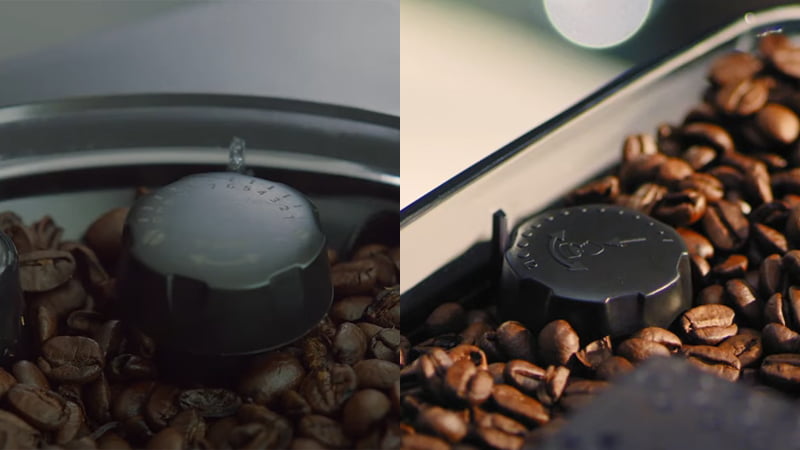
Heating System
The Philips 5400 is a single thermoblock heating system machine with one boiler used to heat up water for preparing both espresso and milk froth. Meanwhile, the Saeco Xelsis is fitted with dual thermoblock boilers to do both simultaneously, with each boiler calibrated to provide a reliable and consistent temperature for each task.
Thermoblock technology is no joke. Unlike a traditional boiler, it can reach the required temperature to brew or steam within a brisk 20 seconds by heating a sufficient amount of water for each function. That means you won’t have to hang around waiting for your favorite caffeinated drink in the morning.
There is a built-in warming plate on top to pre-warm up to two cups to avoid heat loss. By placing your cups on this, they gradually heat up to a temperature that is closer to the optimal temperature for serving espresso. That way, your espresso will be kept at the ideal temperature when frothing milk.
Brewing System
As with most automatic espresso machines, they both have a pre-infusion function. That means they moisten the coffee pucks with heated water before brewing to make them swell and expand, resulting in balanced, flavorful, and aromatic espresso. What the Saeco Xelsis has over its rival is the ability to adjust the length of this stage to your preferences and the specific type of coffee beans used, all through its “Taste” slider. Well, I guess it gets its name since how long the pre-infusion process lasts can really affect the taste of the espresso.
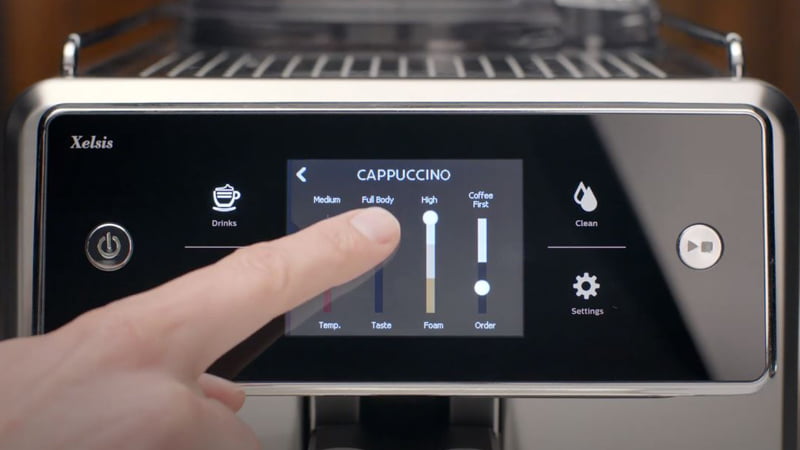
Then they extract coffee at a pressure of up to 15 bars. In the world of super-automatic espresso machines, 9 bars is the minimum pressure needed to pull a nice shot. The fact that these machines exceed this requirement suggests that they are capable of producing high-quality, well-extracted coffee.
In the real world, my tests showed that their espressos taste good with rich crema but are not really superior. They were somewhat weaker than other higher-end espresso machines, but it is a minor trade-off you must accept when opting for a mid-range model.
Milk Frothing System
Another standout thing about these bean-to-cup machines is their ability to prepare milk-based drinks with one touch. This is a boon for those new to the espresso world with a barista knowledge-emptied mind. Instead of patiently frothing milk with a manual steam wand, all you need to do to get a homemade cappuccino is press a button.
Right off the bat, both come with a high-quality milk pitcher but are set up differently. Surprisingly, a few well-known manufacturers, Jura being a prime example, ask for top dollar for their machines but don’t include a milk container as part of the package.
The Saeco Xelsis, similar to Jura machines, requires connecting the carafe to the milk frother via an included tube. Then, the machine sucks milk from the carafe and froths milk twice instead of once to reduce the size of the bubbles.
The result? Unlike many automatic milk frothers that typically yield bubby milk froth rather than microfoam with a creamy and velvety texture, I found the Saeco Xelsis could reach the kind of barista-level microfoam needed for a gorgeous latte macchiato.
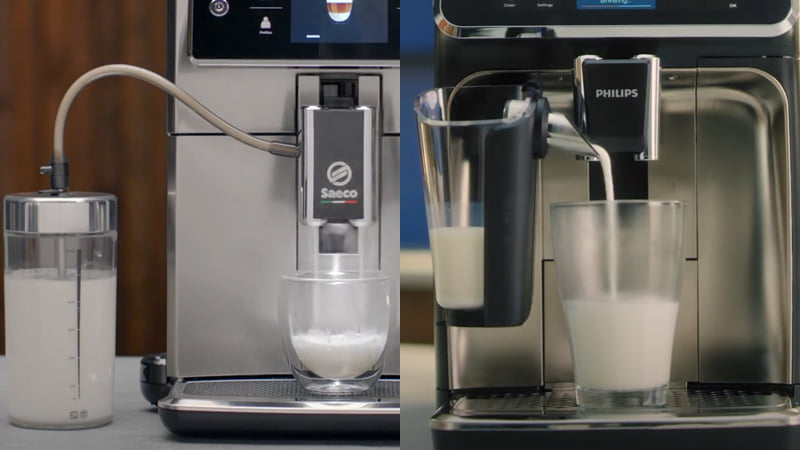
On the other hand, the Philips 5400’s automatic LatteGo milk frothing system includes a transparent pitcher and a large spigot through which the milk froth is automatically frothed and poured into your cup. At first glance, I loved this system since it has no tube where milk can potentially get stuck and crust inside. In addition to me, the milk pitcher is neatly attached to the front of the machine instead of taking up extra space.
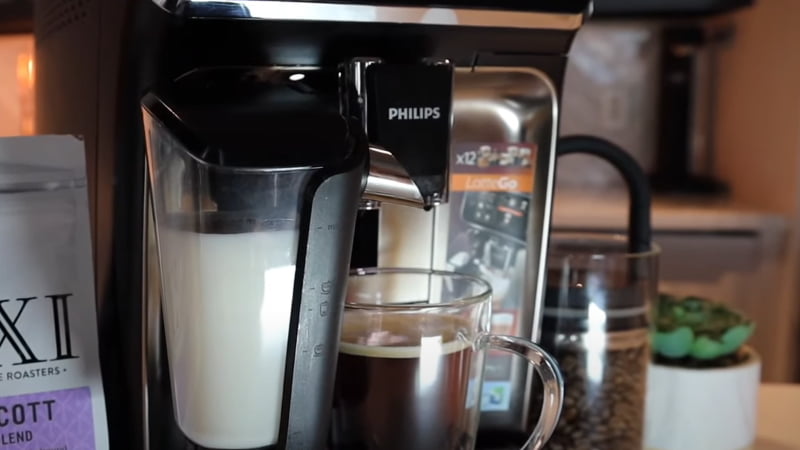
I have a complaint about its lid – there’s no hinge or rubber to keep it in place firmly. Hence, you better be extremely careful whenever you take it out and back to your fridge to prepare a milky drink. Otherwise, the top lid would fly and leave a mess on your countertop or floor. The milk container itself features some labels or markings to indicate how much milk you need to pour to make certain drinks. But they are almost invisible since they have the same color as the carafe, so they aren’t quite useful.
It could create a nice, thick milk froth that’s especially great for a nice cappuccino. However, this one failed to produce the microfoam needed for latte art.
Design & Usability
Winner: Philips 5400
Dimensions, Footprint, & Weight
| Saeco Xelsis | Philips 5400 | |
|---|---|---|
| Dimensions | 11.1 x 15.5 x 19.3 inches | 9.7 x 14.6 x 17.0 inches |
| Weight | 25.8 lbs | 17.6 lbs |
They are generally compact compared to many other fully automatic espresso machines. They are quite deep, but that’s not a big deal, as the front-loading water tanks mitigate the need for frequent pulling out of the machine. The Saeco Xelsis is on the heavy side, so to move it around or set it up, some assistance might be in order.
Regarding the front control panel, the Saeco Xelsis features an intuitive and easy-to-navigate touchscreen, providing a smartphone-like experience. The Philips 5400 adopts a more traditional approach with a substantial control panel with clearly labeled buttons.
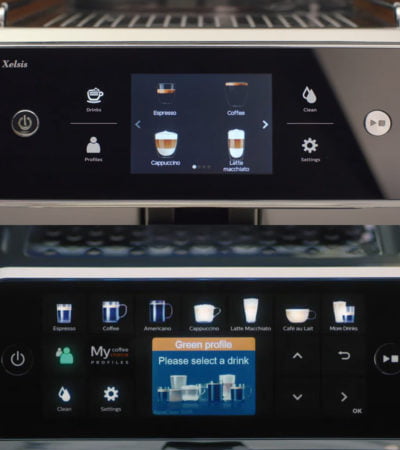
Pre-programmed Coffee Options
| Saeco Xelsis | Philips 5400 |
|---|---|
| Coffee Espresso Ristretto Espresso Lungo Americano Flat White Latte Macchiato Cappuccino Caffe Latte Cafe AU Lait Cortado Milk Froth Warm Milk Hot Water | Espresso Coffee Americano Cappuccino Latte Macchiato Flat white Café au Lait Caffe Latte Caffé crema Ristretto Espresso Lungo Travel mug function Frothed milk Hot water |
They have 14 one-touch programmable drinks, including popular café beverages like espresso, latte macchiato, cappuccino, and flat white. There’s also a bypass dose chute for pre-ground coffee, which is a good option when you run out of beans or your friends are in the mood for decaf.
Personalizing your cup of Joe is a breeze with just a few taps. You can modify the aroma strength, brewing temperature, volume of espresso, and quantity of milk froth. You will need to experiment a few times before finding the ideal combination for your taste buds, but once you are done, everything will be ready with the push of a button.
Spout & Cup Clearance
| Saeco Xelsis | Philips 5400 | |
|---|---|---|
| Spout | Dual | Dual |
| Cup Clearance | 3-6 inches | 3.3-6.9 inches |
Their dual espresso dispensing spouts are height-adjustable to accommodate a wide range of cups. By raising them as high as possible, you can put a wider range of travel mugs under them. But as for preparing espresso, you’ll want to lower the spout as close to the cup as possible to prevent nasty splashes and avoid breaking the stunning crema.
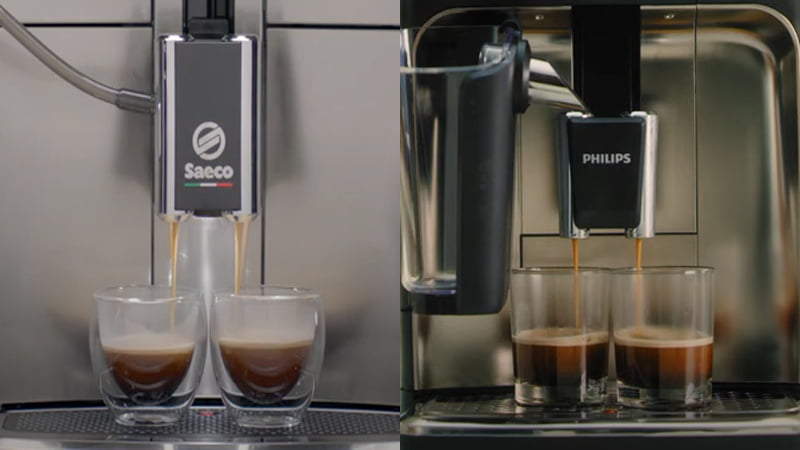
I was glad they could brew a “real” double shot of espresso. I said “real” since they brew with a double dose of coffee grounds instead of only running more water through the same grounds, which can result in over-extraction and bitterness. The Saeco Xelsis takes the lead with the ability to prepare two cups of milk-based drinks simultaneously – Just select the drink via the screen, press the “2X” button, and you and your spouse will soon get your favorite.
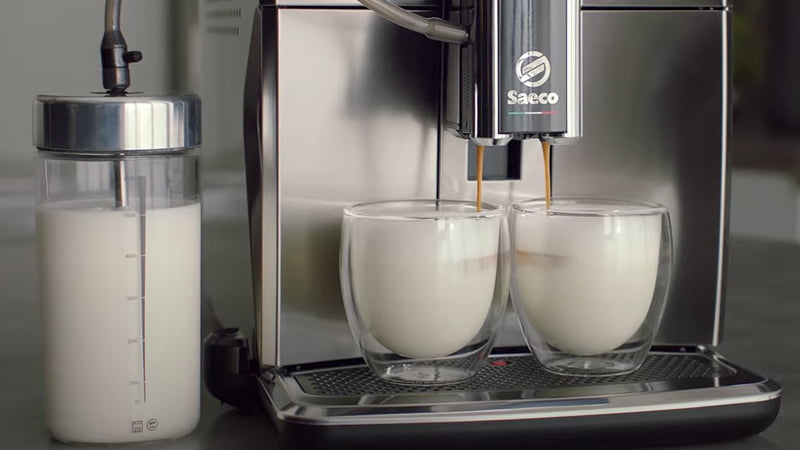
Water Reservoir & Bean Hopper
| Saeco Xelsis | Philips 5400 | |
|---|---|---|
| Water Reservoir | 1.7 liter | 1.8 liter |
| Bean Hopper | 0.35 liter | 0.28 liter |
Their water tanks are front-loading, so there’s no need to pull out the espresso machine or fumble around to fill them up. Also, they can house enough water to brew several cups before refilling. More importantly, you can install an AquaClean water filter in the reservoir of both to improve the taste of your espresso and cut down on the machine’s descaling needs.
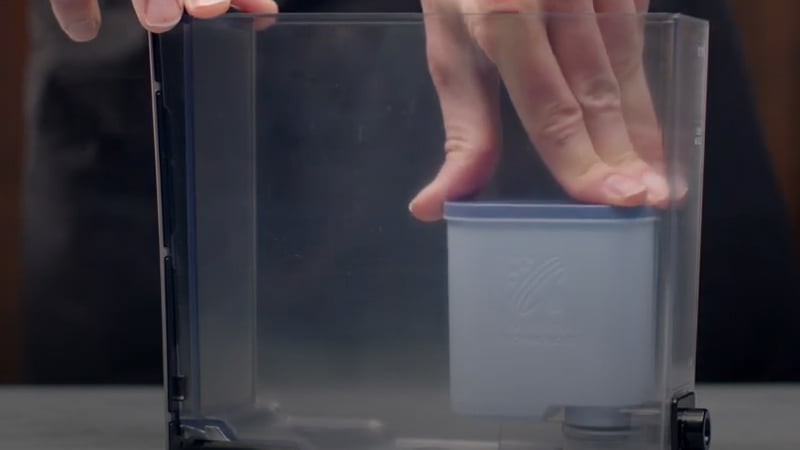
As for their bean hoppers, they can hold enough beans for a couple of days. Don’t worry about them quickly losing their aroma and flavor while sitting there. There is an airtight lid that prevents the beans from coming into contact with air, light, and moisture. That way, the integrity and freshness of the beans are preserved, demonstrating that each cup you brew is as flavorful and aromatic as possible.
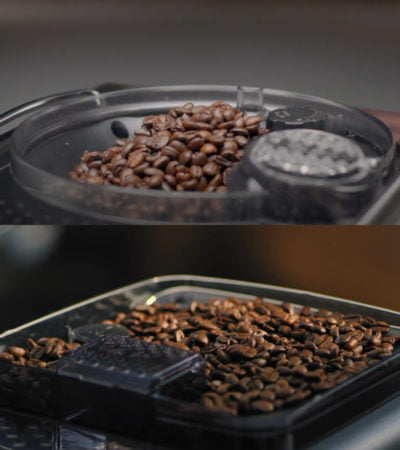
Cleaning & Maintenance
Winner: Tie
Cleaning the Saeco Xelsis vs Philips 5400 is as easy and automatic as brewing your favorite caffeinated beverage, but there’s a manual side to their maintenance. Every day, you should ensure the used grounds container is emptied, the drip tray is cleaned, the milk carafe is rinsed, the water tank is refreshed, and the brewing group is washed to keep the machine in tip-top shape.
For me, the fact that their brew groups are removable is a huge plus. While a machine with an integrated part might seem convenient initially, it can become a nightmare once it malfunctions, and it will. The costs and time involved in professional repairs can be steep. Hence, the ability to remove and clean the brew group oneself represents significant savings in the long run.
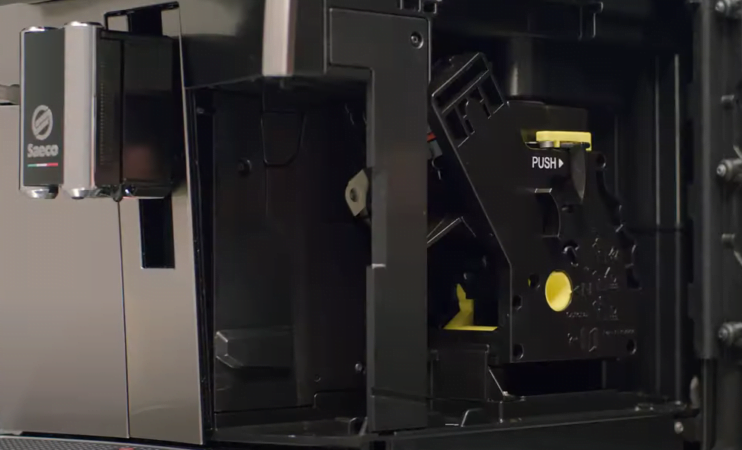
They also have a similar descaling process. They will remind you when a descaling cycle is needed, and all you need to do is fill the water container with the recommended descaling solution and water and put the machine in descaling mode. If you choose to use filters, you won’t need to do this chore too often.
Utilities & Other Features
Winner: Saeco Xelsis
User Profile
If you aren’t the only coffee lover in your family, you will love the user profile feature. After all, no one wants to spend hours figuring out their ideal settings only to find out someone changed them the next morning.
To deal with this, the Saeco Xelsis vs Philips 5400 offers 6 and 5 user profiles, allowing you and a few like-minded people to have personalized settings on the machine without cross-interference. This function is almost useless in your workplace, but half a loaf is better than none, anyway!
Auto Shut Off
If you are a guy or gal who is forgetful and often in a rush to leave the house with one or more devices running, this feature is an electricity saver for you. These machines can be programmed to automatically go off after a period of time ranging from 15 to 180 minutes. Not only does this cut down on your electricity bills and extend the machines’ lifespan, but it also protects the environment.
Quick Rundown Of Saeco Xelsis
- With Philips Saeco Xelsis easily make up to 15 coffee varieties from common Espresso and Capuccino to specialty coffees like Flat White or Americano. Simply swipe the touchscreen to select the drink and customize it with our intuitive Coffee Equalizer.Filter type:Reusable.Power consumption stand-by : 0.5W, Drip tray capacity : 500 ml
- 15 Coffee Varieties at Your Fingertips: Explore the world of coffee - Espresso, cappuccino, macchiato, and a range of specialty drinks
- Personalized Preferences: Everyone’s custom coffee favorites can be saved in up to 6 user profiles for instant selection. Personalize each profile down to the finest detail
- LatteDuo Milk System: Prepare and enjoy single or double serving of any coffee recipe with one touch, including Cappuccino or Latte Macchiato
- Double Thermo Blocks: Dedicated for both brewing and steaming offer accurate temperature controls for every drink in your recipe book
Last update on 2025-04-14 / Affiliate links / Images from Amazon Product Advertising API
Quick Rundown Of Philips 5400
Product Videos
Related Articles to Saeco Xelsis
- Saeco Xelsis vs Xelsis Evo: 2 Versions Of The Xelsis Line – Which One Is Better?
- Saeco Xelsis vs Miele CM 6350: Honest Review Of 2 Potent Mid-range Espresso Machines
- Saeco Xelsis vs Siemens EQ 9: Which One Should You Choose?
- Saeco Picobaristo vs Xelsis: Ultimate Guide To Choosing #1 Espresso Machine For You
- Saeco Xelsis Vs Philips 3200: Choosing the Better One!
- Jura J6 vs Saeco Xelsis: Why You Should Pick One Of These Poweful Espresso Machines
- Jura E6 vs Saeco Xelsis: What Brewing Conveniences Do These Espresso Machines Offer?
- Jura Z6 vs Saeco Xelsis: Which One Should You Invest Money In?
- Jura Z8 Vs Saeco Xelsis: A Detailed Head-To-Head Comparison
- Saeco Xelsis vs Jura Ena 8: A Newest Honest Review and Detailed Comparison
- Saeco Xelsis vs Jura E8: A Close Call For The Title Of Best High-end Espresso Machine
- Gaggia Accademia vs Saeco Xelsis: Compare The 2 Advanced Espresso Machines
- Gaggia Babila vs Saeco Xelsis: Which Is The Ultimate Super-automatic Espresso Machine For You?
- Saeco Xelsis vs Gaggia Cadorna Prestige: Top Differences Between 2 Mid-range Machines
- DeLonghi Eletta Vs Saeco Xelsis: Which is Better?
- Saeco Xelsis vs Jura S8: Which Brews Better Coffee?
- Philips 3200 Lattego vs Saeco Xelsis: Comparing 2 Popular Models For Milk-based Coffees
- Breville Oracle Touch Vs Saeco Xelsis: Hot Comparison You May Not Know
Related Articles to Philips 5400
- Delonghi Dinamica Plus Vs Philips Lattego 5400: Which One is Best Bang for Your Buck?
- Philips 3200 Vs 5400: An Honest Comparison Between Two Machines With Various One-touch Beverages
References
- Saeco Xelsis: https://saeco.com/xelsis/
- Philips 5400: https://www.usa.philips.com/c-p/EP5447_94/philips-5400-series-fully-automatic-espresso-machines

I’m Floyd J. Alcock, an experienced barista with a deep love for coffee. I curate personalized coffee experiences, guiding customers through diverse flavor profiles and suggesting ideal brewing methods. My extensive knowledge of espresso machines enables me to recommend the best equipment to match specific needs and budgets. Sharing my expertise and passion with coffee enthusiasts brings immense satisfaction. I look forward to continuing my journey of coffee discovery with every customer I serve, fostering connections over a shared love for this magical beverage.
